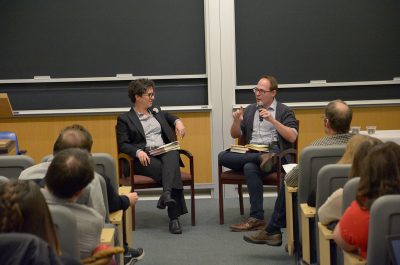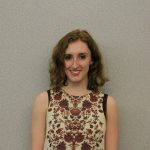
More than 50 students gathered in Boston University’s College of Arts and Sciences Monday afternoon for a conversation about the history of religion, sexuality and LGBT rights in America.
The talk, “Reforming Sex: Religion and Politics in Modern America,” was organized by BU professor Stephen Prothero, who teaches a class on religion and politics at BU. He opened the discussion with a disclaimer.
“Today we’re going to talk in public about three of those things you’re really not supposed to talk in public about: religion, politics and sexuality,” Prothero said.
Two professors on religion and women’s, gender and sexuality studies — Heather White from the University of Puget Sound and Anthony Petro from BU — explored the relationship between Christianity and sexuality in the United States.
Throughout the semester, Prothero brought several authors into the classroom, discussing topics like race and class in relation to politics. This conversation, however, had a different focus — sexuality.
Prior to the event, Prothero said in a phone call that he hoped this discussion would help students broaden their understandings about these topics.
“I hope people realize that both religion and sexuality are very complicated things and that some of the simple ideas we conceive about each of them are probably wrong,” Prothero said. “I hope Petro and White will help complicate a lot of things in a positive way for the students who come.”
White’s “Reforming Sodom: Protestants and the Rise of Gay Rights” and Petro’s “After the Wrath of God: AIDS, Sexuality, and American Religion,” publications that inspired the event, are two of the first academic books to look at the history of sexuality and religion in the United States, Petro said before the event.
“This event is a way to share some of our findings but also to spark further discussion on the role of religion and sexuality in public life,” Petro said. “A quick glance at news headlines from the past year would demonstrate how often religion and sexuality both appear in the news, especially in news about politics. In most coverage, we see conservative religious voices pitted against secular liberals fighting for gender and sexual equality.”
Petro said that the purpose of the conversation was to go further than discussing conservative Christian views on sexuality and to open up to a broader range of perspectives, including those of religious moderates, liberals and the LGBT community. He said he hopes the conversation challenged the idea that all Christians are conservative or that all queer people are secular.
“Religion is supposedly nonsexual, and sexuality is supposedly nonreligious,” Petro said. “I hope this event informs people about the often forgotten or unknown backstories to more current debates regarding sexuality and religion.”
The conversation spanned topics of sexuality in American history, from changing interpretations of the Bible, to the AIDS epidemic, to the election of Donald Trump.
“If you were to open a new international version of the Bible, it would say in the very text that men who have sex with men are among the sinners,” White said. “But if you were to look at the old King James’ version, it’s not nearly as specific. There’s been a lot of work to approach what the original words meant in their original context, and that’s always changing.”
Several students, such as Laura Bustos, a sophomore in CAS, said the conversation was informing and engaging.
“I enjoy types of events that are conversations instead of lectures,” Bustos said. “It’s easier to listen to and more engaging when people ask questions and with something so informal.”
Lisa Mun, a sophomore in the Sargent College of Health and Rehabilitation Sciences, said the most interesting part of the conversation was putting religion and sexuality into the context of modern politics.
“This issue was interesting particularly because of the recent election,” Mun said. “It’s important to hear about what has happened in the past and keep that in mind with Trump.”
Emily Shawn, a CAS senior, said the discussion reflected on important social science topics.
“If anyone is interested in social sciences, religion is a good thing to look at, because it influences people’s life a lot more than they’re aware of,” Shawn said.














